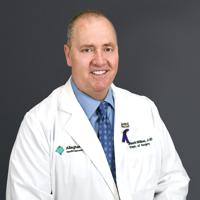Learn more about our appointment options, second opinions, locations, referrals, and resources that are at your disposal.

Pancreas Cancer Center of Excellence
About the Pancreas Cancer Center of Excellence
At AHN, we see you and your needs first. A diagnosis of pancreas cancer can bring a lot of emotions and worries. We’re here with you. The Pancreas Cancer Center of Excellence at AHN Cancer Institute provides high quality, personalized and exceptional multidisciplinary care to our patients. That means you have a dedicated team of proven, skilled, and compassionate medical professionals to provide groundbreaking care.
Our experienced team of pancreas cancer specialists involved in your care includes:
- Gastroenterologists
- Medical oncologists
- Surgical oncologists
- Radiation oncologists
- Radiologists
- Pathologists
- Geneticists
- Nutritionists
- Nurse navigators
- Social workers
- Exercise specialists
- Supportive care physicians
- Advanced practice providers
- Nurses
-
Appointments
Cancer Institute(412) 578-HOPE
We diagnose our patients with highly sophisticated, safe techniques using the latest technologically advanced methods. Your entire care journey is considered, and we understand how overwhelming a diagnosis can be. To help you navigate your way through your care plan, our nurse navigator assists patients though their journey while they meet with their team of physicians with expertise in treating pancreas cancer. In addition, so you have access to all options, you can pursue clinical trials using innovative treatments.
High-Risk Pancreas Cancer Clinic
For those who are at higher risk for developing pancreas cancer, AHN has the multidisciplinary High-Risk Pancreas Cancer Clinic. The clinic is focused on early identification of pancreatic cancer or precancerous lesions in patients at elevated risk. Risk assessment; genetic counseling and testing; screening using CT, MRI, and endoscopic studies; and surveillance for ongoing monitoring is performed. This means you can get a full picture of your specific risk factors, health care plan, and additional support. Patients are educated on risk factor modification. Learn more about the AHN High-Risk Pancreas Cancer Clinic.
Treating pancreas cancer
Pancreas cancer is the third-leading cause of cancer death in the United States and is expected to be the second leading cause by 2030. Pancreatic cancer occurs when cells start to rapidly and abnormally multiply in the pancreas to form a tumor. Many pancreas cancer patients are diagnosed at an advanced stage since patients do not develop symptoms at an early stage.
Learn more about symptoms, stages, and treatments on our pancreatic cancer.
Gastroenterology
Given the location of the pancreas, in the upper abdomen and behind the stomach, those with pancreas cancer will most likely have a gastroenterologist in the care team. AHN gastroenterologists are highly skilled and specially trained to perform procedures that will help diagnose pancreas cancer with precision and care.
These procedures include:
- Endoscopic ultrasound (EUS) and endoscopic ultrasound-guided biopsy: This is a minimally invasive procedure that uses a flexible tube that is inserted into the gastrointestinal tract and uses sound waves to create detailed images of the nearby pancreas and adjacent organs like the lungs, liver, bile ducts, and lymph nodes. The endoscopic tube has a thin needle that can collect tissue from the pancreas tumor or obtain fluid for a biopsy. This procedure stages and diagnoses pancreas cancer and other conditions of the pancreas.
- Endoscopic retrograde cholangiopancreatography (ERCP): A technique that combines the use of endoscopy and fluoroscopy to diagnose and treat certain problems of the biliary or pancreatic ductal systems. The physician can visualize the stomach and duodenum and can inject contrast medium into the ducts of the biliary tree and pancreas to obtain images to help diagnose pancreas lesions. Stents to open up the bile and pancreas ducts are placed via an ERCP.
- Biliary and pancreatic duct endoscopy (cholangioscopy and pancreatoscopy): An endoscopy procedure used to visualize and detect abnormalities in the bile and pancreas ducts.
- Celiac plexus neurolysis (CPN): This is also known as celiac nerve block that uses an endoscopic ultrasound to identify the celiac nerve and then inject it to relieve the pain from pancreas cancer.
Radiology
To ensure your AHN care team gets a full picture of your health, radiology is used for screening and diagnosis. Our radiologists interpret the imaging tests to make a diagnosis and stage the cancer. Using these results, your care team will be able to tailor treatment that is specific to your needs.
Some of the imaging studies include:
- Computed axial tomography (CAT or CT) scan, pancreas protocol
- Magnetic Resonance Imaging (MRI)
- Magnetic Resonance Cholangiopancreatography (MRCP)
- Ga68 DOTATATE PET scan for neuroendocrine tumors
- PET/CT scans in special circumstances
Nutrition
During the course of pancreatic cancer treatment, some patients struggle with nutrition and can experience certain gastrointestinal side effects. AHN uses a team approach to ensure you are getting care that supports your whole health. Our Cancer Navigation Team includes dedicated dietitians who are highly experienced in working with pancreatic cancer patients. You will get the nutrition support necessary to help you through your treatment.
Pathology
Once you are done with testing, the next step is pathology. A biopsy (sample) will be taken of the area of concern as it is the only way to be sure that someone has pancreas cancer. A pathologist will look at the pancreas biopsy under the microscope and make a diagnosis to determine the type of cancer, so your team can map out your treatment and tailor it to your specific needs.
Medical oncology
Your medical oncologist will recommend anticancer therapies that can stop the growth of cancer cells by killing them or slowing down the growth by preventing them from multiplying. At AHN Cancer Institute, we personalize your treatment based on the mutations in the tumor. We test the tumor and blood for mutations, also called biomarkers, that can be targeted with a specific therapy that could be in the form of an IV chemotherapy, a pill, or targeted therapy, including immunotherapy. We can obtain germline (genetic) testing by a blood test or saliva test to determine if you have a hereditary predisposition to pancreas cancer. We do this to ensure there is a full picture of your health, risk factors, and genetic makeup. At AHN, our comprehensive, high-quality care puts an emphasis on providing treatments that improve survival and maintain quality of life. Learn more about AHN medical oncology.
Surgical oncology
Surgery may be a treatment option depending on the location of the tumor and if it has not spread to a distant organ. Your AHN care team will walk you through the available options and are here to discuss, in detail, what that means for your specific diagnosis.
Surgeries performed could include:
- Whipple procedure, which can be performed laparoscopically, robotic, or open when the tumor is in the head of the pancreas.
- Distal pancreatectomy, when the tumor is in the body or tail of the pancreas.
- Total pancreatectomy, when the tumor occupies the whole pancreas.
- Palliative surgery, which relieves symptoms from a blocked bile duct or intestine to alleviate discomfort.
- Enucleation, which is performed for neuroendocrine tumors.
- Laparoscopy, which is a minimally invasive surgery is used to see whether the tumor has spread throughout the abdomen.
Learn more about AHN surgical oncology.
Radiation therapy
Radiation therapy has traditionally been used for pancreas cancer when a patient’s tumor is not able to be surgically removed. AHN uses the latest in modern radiation therapy techniques to provide patients with improved outcomes. These techniques may include:
- Magnetic resonance directed radiotherapy (MR-guided), which provides improved image localization, real-time motion monitoring, and adaptive treatment planning to increase dose to tumor while avoiding surrounding vital organs.
- Elekta Unity MR-Linac (MRL), a state-of-the-art MR-guided adaptive treatment that is used for nonoperative tumors.
- Conventional radiation treatment, which is used to stop or slow the cancer’s progression.
High-Risk Pancreatic Cancer Clinic
The High-Risk Pancreatic Cancer Clinic specializes in assessing individuals with a family history or genetic predisposition to pancreatic cancer. It provides thorough evaluations, including genetic testing and consultation, to identify if you may be at increased risk. You’ll experience personalized management strategies for early detection and prevention. Specific risk factors, called screening protocols, are tailored to your risk profile. Overall, the clinic aims to improve outcomes through proactive interventions and targeted care for those with a heightened susceptibility to pancreatic cancer. Learn more about the AHN High-Risk Pancreatic Cancer Clinic.
Nutrition
Oncology dietitians play a crucial role in the management of pancreatic cancer by providing individualized nutrition education and counseling. Due to the impact of pancreatic cancer on appetite, digestion, and absorption, maintaining adequate nutrition can be challenging for these patients. Your oncology dietitian can help navigate changes to normal nutrition habits, manage disease symptoms and side effects from cancer treatment, and ensure you receive necessary nutrients to support overall health and treatment outcomes. AHN oncology dietitians work collaboratively with other members of the health care team to develop an appropriate nutrition plan for each patient. As members of the Oncology Navigation team, the clinical dietitian offers nutrition education, counseling, and support to improve quality of life for pancreatic cancer patients.
Supportive care and palliative medicine
Your doctor may refer you to palliative care during treatment to help you feel better, prevent or treat side effects of your treatment, and address any emotional or support issues to improve your quality of life. We offer expertise in treating pain and other symptoms of illness while providing emotional support for the patient and family as they navigate through the complex and challenging health care system. Supportive care aims to ensure that patients can remain as comfortable and active as possible through the stages of serious illness. Learn more about AHN supportive care and palliative medicine.
Integrative oncology
Integrative oncology, or complementary medicine, combines the theories of integrative medicine alongside conventional oncology therapies to address symptom management using nonpharmacologic treatment modalities. Through the Integrative Oncology program at AHN, you have access to several complementary therapies such as acupuncture, massage therapy, and Reiki therapy. Our goal is to provide you with evidence-based, safe, and effective complementary therapies that address our patients’ physical, emotional, and spiritual needs. The hope is to provide recommendations and strategies to enhance your quality of life, and decrease symptom and side effect burden, while enabling you to be involved in your care.
Oncology rehabilitative therapy
Oncology rehabilitation specializes in physical and occupational therapy that focuses on the functional impairments you may have due to cancer and its treatment. “Prehab” begins before your cancer treatment starts, can improve your strength and tolerance for treatment, and prepare you for your surgery. Oncology rehab helps to reduce fatigue, pain, tissue tightness, stress, anxiety, inflammation, swelling, and improve balance and muscle strength.
Pancreas cancer specialists
At the AHN Cancer Institute, our team of pancreatic cancer specialists are ready to provide the most effective treatments should you or someone close to you ever need it.
The AHN Pancreatic Cancer Leadership team meets regularly to discuss and confirm the right combination of therapies for a patient. We work with you to get an accurate diagnosis and to create an effective strategy for your treatment. With the new AHN Cancer Institute Research Hub, we’re driving the future of cancer care and delivering it at a location that’s convenient for you.
Specialty Leads


Surgical Oncology Lead

Gastroenterology Lead

Radiation Oncology Lead

Medical Oncology Lead

Radiology Lead

Exercise Lead

Integrative Medicine Lead
Kossivi Dantey, M
Pathology Lead
Kyla Morphy
Genetics Lead
Rachel Harken, RD
Nutrition Lead
Kathleen Robson, RN
Nurse Navigator
Medical Oncology

Pancreas Cancer Disease Site Leader, Associate Prof. of Medicine, Drexel Univ.

Medical Oncologist

Medical Oncologist
Use Find Care for a full list of medical oncologists.
Surgical Oncology

Surgical Oncology Lead

Surgical Oncologist

Surgical Oncologist

Surgical Oncologist

Surgical Oncologist
Use Find Care for a full list of surgical oncologists.
Gastroenterology

Gastroenterologist

Gastroenterologist

Gastroenterologist

Gastroenterologist

Gastroenterologist

Gastroenterologist
How to get care
If you want to be tested for or have been diagnosed with pancreas cancer, we’re here to help.
Call (412) 578-HOPE (412) 578-4673 to schedule an appointment at any location within the Allegheny Health Network Cancer Institute or connect with a nurse navigator.
What to expect from your first appointment
Your nurse navigator and support professionals will guide you through the process, and doctors will explain everything and answer any questions you or your loved ones have.
Our locations
Visit our Cancer Institute locations page to find a location near you.
Clinical trials and research
Clinical trials are research studies where new drugs or procedures are tested. In cancer research, clinical trials answer questions about ways to treat cancer, find and diagnose cancer, prevent cancer, or manage symptoms of cancer or its treatment. Choosing to join a clinical trial is something your care team, you, and your family can decide together. Clinical trials are open to people who meet certain research criteria and who choose to take part.
At AHN we have an innovative clinical trial assessing the impact of exercise during chemotherapy on patients who are planning to undergo pancreas surgery. Find all our current active pancreas cancer clinical trials.
Cancer clinical trials and research
The AHN Cancer Institute is a pioneer in cancer research and participates in clinical trials of new medical oncology therapies that are open for patients who qualify and wish to participate. Patients are screened for consideration with ongoing clinical trials at every stage of their treatment.
What is a clinical trial?
Clinical trials are studies that try to answer questions about new ways to treat cancer with medications, radiation, or surgical techniques. Previous trials have shown how new methods of treatment improve survival and quality of life and reduce the risk of cancer returning.
You participate in a clinical trial only if you volunteer to do so and meet criteria for inclusion in the study, and you can stop participating in a trial at any time.
Who can join a clinical trial?
The plan for the trial, called a protocol, explains what the trial will do and how the study will be done. Based on the questions the research is trying to answer, each clinical trial protocol outlines specific criteria necessary to be eligible to join the trial.
Common criteria for entering a trial are:
- Having a certain type or stage of cancer.
- Having received a certain kind of therapy in the past.
- Being in a certain age group.
- Federal rules help ensure that clinical trials are run in an ethical manner, with your rights and safety protected. It’s to ensure that you’re not put at increased risk by participating in the trial, and that the results of the study are accurate and meaningful.
Conducting clinical trials helps us contribute to Cancer Moonshot — an initiative created in 2016. The goal is to prevent more than 4 million cancer deaths by 2047 and improve the experience for people affected by cancer. We’re doing our part to join this fight by collaborating with more than 60 private companies, patient groups, academic institutions, and nonprofits.
Currently active cancer clinical trials
If you would like to participate in a clinical trial and help our innovative team discover groundbreaking cancer solutions, ask your doctor if you’re eligible to participate in one. Find currently active clinical trials that are open for participation.
Refer your patient to an AHN specialist
There are two ways for medical professionals, who are not a part of Allegheny Health Network, to refer their patients to an AHN specialist and request their first appointment. You can:
- Call (412) 578-HOPE (412) 578-4673 to speak with an AHN Cancer Institute scheduling coordinator.
- Go to Find Care to find the right AHN specialist and the most convenient location. Then refer your patient, provide relevant patient details, and request an appointment directly from the doctor’s profile.
For more information about referring your patient to an AHN specialist, read the Independent Physician Referral FAQs.
After referring your patient
Once your patient is receiving care from an AHN specialist, you can view their test results, see their treatment plan, follow their treatment progress, and collaborate with our team using the EpicCare® Link™ platform.
If you are new to EpicCare Link, or need to request your own EpicCare Link account, read: EpicCare Link for Patient Follow-up, for user instructions and new account request forms.
When EpicCare Link is not an option for a patient's AHN medical records
If you can’t access your patient's AHN test results through the EpicCare Link platform, your patient will need to complete and submit the correct AHN Medical Records Release form, based on their state of residency. Support your patient’s request by downloading the correct medical records release form for them:
EpicCare® is a registered trademark of Epic Systems Corporation and used with permission.
EpicCare® Link™ is a trademark of Epic Systems Corporation and used with permission.

